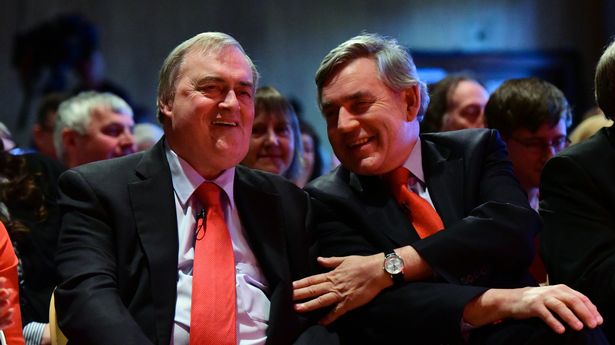John Lennon wrote a famous song about a working-class hero.
John Prescott would never have used the words "working-class hero" about himself—he always underplayed his achievements—but knowing John, I don't think he would have complained if others used these words for him.
There are few who achieve something akin to heroic status in their own lifetime, particularly those who have to deal with the messy compromises of being in government.
But John Prescott became—and will remain—a Labour movement legend.
He started from humble beginnings, and after failing his 11 plus, he never got the bike he had been promised if he had passed the exam. He joked his first girlfriend rejected him because his spelling, revealed in a letter to her, was so bad. So, after leaving school at 15, he decided to educate himself.
Not content with being a waiter and cabin steward on a Cunard liner, his quest for an education led him to sign up for correspondence courses and then college. He was never anything other than grateful for the opportunities he then enjoyed at Ruskin College Oxford and Hull University and devoted the rest of his life to getting these chances for others too.
And this hero was always passionate in his beliefs in fairness for all, courageous in fighting for the causes he adopted, and despite an outwardly deceptive image of uncompromising toughness, he was very generous, believing in the good in everyone—even the egg thrower in Wales who John famously punched during a general election campaign, of course in self-defense.
After his studies at Oxford and Hull, his rise was meteoric: union official, Labour MP, Labour frontbench spokesman on the regions, and then the positions of Deputy Labour Leader and Deputy Prime Minister.
And his achievements in government should not be forgotten.
With Al Gore, he was the moving force behind the first agreement on climate change at Kyoto. Angry at areas left behind by coal, steel, textile, and port closures, John was the pioneer of modern regional policy, which paved the way for devolution and elected Mayors.
Without his determination as environment minister, 1.4 million homes would not have been improved—a record figure with half of all social housing modernized to the benefit of thousands of families who escaped damp, overcrowded, and insanitary conditions.
From 1992, he was helping John Smith and Tony Blair reform the Labour Party to make it electable, and then the former boxer was key to holding the ring and keeping things together during difficult times such as over Iraq.
John and his wife Pauline were always a glamorous couple; she and their sons were always devoted to supporting his work, and our thoughts at this time are with her and her sons and wider family.
Be the first with news from Mirror Politics
US ELECTION WHATSAPP: Join our US Election WhatsApp group here to be first to get all the biggest news and results as America heads to the polls. We also treat our community members to special offers, promotions, and adverts from us and our partners. If you don’t like our community, you can check out any time you like. If you’re curious, you can read our Privacy Notice.
POLITICS WHATSAPP: Be first to get the biggest bombshells and breaking news by joining our Politics WhatsApp group here. We also treat our community members to special offers, promotions, and adverts from us and our partners. If you don’t like our community, you can check out any time you like. If you’re curious, you can read our Privacy Notice.
NEWSLETTER: Or sign up here to the Mirror's Politics newsletter for all the best exclusives and opinions straight to your inbox.
PODCAST: And listen to our exciting new political podcast The Division Bell, hosted by Mirror interim political editor Lizzy Buchan and Express political editor Sam Lister, every Thursday.
John’s courage saw him through difficult times. He was diagnosed with diabetes and then bulimia and was open and honest about the changes in diet and lifestyle he had to make to cope with the conditions, helping others to adapt along the way. Latterly, he had severe Alzheimer’s, a condition he wanted the country to take more seriously with better research and treatment. But through it all, John smiled and joked and was warm-hearted when talking to friends.
Being a working class hero was, as Lennon knew, a difficult thing to be. But our John Prescott coped - always fighting hard for the good things in life for everyone - not just himself. Lennon also knew that Britain has always been a country where there is so much potential but too little opportunity. But our John Prescott always challenged Britain to be a better country. And it will be a tribute to his legacy when more and more people, whatever their start in life, can, as John did, realise their talents to the full.
